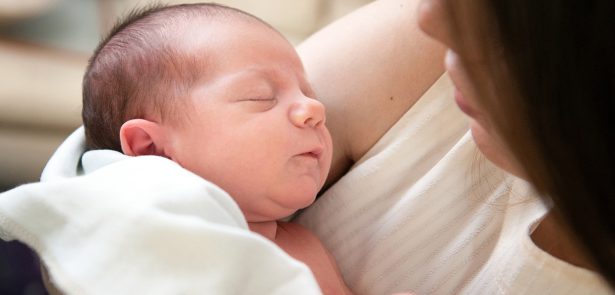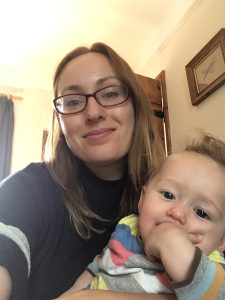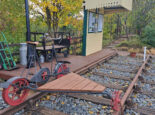Keeping Mum

Why does our prenatal education focus so much attention on birthing babies and less on the care of the new mum afterwards? Laura Fanthorpe looks at what more could be done to 'hold the mother, not just the baby'.
 I remember seeing sunlight for the first time after my baby was born. It had been four days. Placing my hands against the cool glass, I looked down at the scene below. The bare-branched trees, and the snow falling across the grey tarmac, felt like a surprise.
I remember seeing sunlight for the first time after my baby was born. It had been four days. Placing my hands against the cool glass, I looked down at the scene below. The bare-branched trees, and the snow falling across the grey tarmac, felt like a surprise.
To be honest, I’d lost track of time. I didn’t really know what day it was any more, much less the weather. It turned out to have been stealthily snowing. Small frozen flurries floated across the hospital car park.
During this time my living quarters had been narrowed down to a hospital bed, a curtain wrapped around a cubicle, and the clear plastic cot. Looking down at the car park, the trees, and the parkway beyond, I could also see my face in the glass. I tried to remember who I was.
Because, in preparation for having a child, so much of the focus seems to be on birthing the baby. But there is very little information about the immediate aftermath of becoming a mother. ‘How you will feel’ is a well-kept secret, hidden from generation to generation. Perhaps we fear that by showing any kind of negativity it might make us seem less grateful for the safe delivery of our child.
My son made his arrival into the world at 6.20am on a Thursday, and was immediately taken to the newborn intensive care unit. After the birth – partner sent home – I spent my first night in a shared ward alone. I stayed in bed, struggling to sleep. Support socks pulled up to my knees and a huge pad wadded between my legs.
I was in a weird in-between place, hearing other people’s babies cry. Waiting to be reunited with mine, and wondering if I would recognise him. I was a mum/ un-mum. In the end, I was lucky. My son was soon healthy again and – when I was able to hold him – I felt his heartbeat skipping against my skin and knew absolute love.
 We muddled through those early days together and became perfectly imperfect together. However, there’s no denying it was the hardest time of my life. You think you’re prepared for having a child, but the truth is that – however many books you read – nothing really provides you with the reality. Having a baby is world-and-life- shattering.
We muddled through those early days together and became perfectly imperfect together. However, there’s no denying it was the hardest time of my life. You think you’re prepared for having a child, but the truth is that – however many books you read – nothing really provides you with the reality. Having a baby is world-and-life- shattering.
You birth the baby, then you’re required to put another person’s needs before your own at all times – for the following hours, days, weeks, and years. It is relentless. And you deal with that newborn baby while bleeding, sweating, leaking and inhabiting a body that feels utterly alien. I was amazed how suddenly the specialness of pregnancy feels long-gone.
As a society we worship the newborn, cooing over every gurgle and stretch, as perhaps we should. On the other hand, the mother is simply expected to have a body that ‘snaps back’ into shape. She has to face a flurry of (hopefully) well-meaning advice. Complete strangers can offer comments on everything from how to feed the baby, sleep advice, and even whether you hold the child too little or too much (as if that’s a thing).
Having experienced the postpartum period twice now, there’s an expression that rings so true to me. It’s ‘hold the mother, not just the baby’. Because the truth is that being a new mum can be lonely. Day and night become the same in an endless routine of feed, sleep, change. Repeat.
When you do eventually get the chance for adult conversation, it’s easy to start second-guessing yourself, thinking ‘is this how I used to talk?’ and ‘do I sound like the old me?’ Because it’s hard to remember that person. And it’s difficult to feel interesting when your days revolve entirely around meeting the needs of a small person.
I’m not alone in feeling like this. When a friend of mine had her first baby she experienced such a crippling range of emotions, hormones and anxiety, that she told me “I thought I was going mad.”
 The truth is that modern life perhaps doesn’t offer enough support for new mothers, and it shows. 91% of pregnant women do not feel they are given enough advice about postpartum recovery. Many new mums feel abandoned after birth, and that the six-week check-up exists just to offer them advice on contraception. Our amazing midwives and NHS services have become enormously overstretched, and simply don’t have the time and resources to dedicate to the follow-up postnatal support that’s really needed.
The truth is that modern life perhaps doesn’t offer enough support for new mothers, and it shows. 91% of pregnant women do not feel they are given enough advice about postpartum recovery. Many new mums feel abandoned after birth, and that the six-week check-up exists just to offer them advice on contraception. Our amazing midwives and NHS services have become enormously overstretched, and simply don’t have the time and resources to dedicate to the follow-up postnatal support that’s really needed.
Julie Bickerton, Founder of Nomad Therapy, which was set up to support and nurture women throughout pregnancy and postnatally, explains: ‘Often, a woman’s family is not geographically close anymore. Our families have become spread out and this means the support is no longer readily available to the new mother. This may have dramatic effects on the ability of the mother to care for her baby when her ‘village’ is not there to raise the child.’
Julie continues: ‘Time and rest are needed to adapt along this transition to motherhood. It is a process which absorbs her moment by moment. If she has her needs met, then she is able to invest her emotional energy into caring for her baby. This is not just the day to day physical care, this is the enormous and underestimated amount of attention she uses to observe her baby’s ‘cues’, to ‘baby- gaze’. If the mother is cared for, she is more likely to bond deeper with her baby, to allow the natural hormonal flow and fluctuations of early motherhood to be felt and absorbed, rather than ‘getting on with it’ which, as women, we are generally very good at.
‘Postnatal care is sadly undervalued. The emphasis on moving mother and baby along the ‘conveyor belt of care’ means that we are missing out vital support which can have negative long-term impacts. Breastfeeding support is lacking; information on healing after a vaginal or C-section birth is scarce; postnatal midwifery/ health visitor visits are minimal. A culture of box ticking means that, despite the best intentions, problems are missed. Overstretched and underfunded midwifery services do not allow for wraparound postnatal care where the new mother is supported and where, if needed, she can process the experience of her baby’s birth. A huge systemic change needs to happen to rectify these issues.’
Many of us don’t have families close by. And, as much as we might have supportive partners, the typical paternity time is over like a flash. It leaves both parents wishing they had longer to learn how to function as a new family. Mum-of-two Chloe agrees: ‘The ticking clock of two weeks of paternity leave was ever-present in my mind. I felt I had to learn to look after my child on my own as soon as possible.’
 Lack of support can affect every aspect of how we care for our newborns and ourselves. In the UK we have some of the lowest breastfeeding rates in the world, with eight out of ten women stopping breastfeeding before they want to, according to Unicef. How you choose to feed your baby is completely up to you, but women wanting to breastfeed and having to give up sooner than they wish perhaps indicates that they’re not receiving the support needed to establish breastfeeding or overcome any issues.
Lack of support can affect every aspect of how we care for our newborns and ourselves. In the UK we have some of the lowest breastfeeding rates in the world, with eight out of ten women stopping breastfeeding before they want to, according to Unicef. How you choose to feed your baby is completely up to you, but women wanting to breastfeed and having to give up sooner than they wish perhaps indicates that they’re not receiving the support needed to establish breastfeeding or overcome any issues.
And what happens when there are problems caused by the birth to contend with too? Around 30,000 women a year experience birth trauma in the UK, leaving women with flashbacks and anxiety. The MASIC Foundation found that 85% of mothers who suffered severe injuries during birth say their experience damaged their relationship with their child.
Becoming a parent can often put a strain on the relationship with your partner too. It completely changes the dynamic. You’re both exhausted, there’s less time available to spend with each other, and it’s hard to understand each other’s lives if one of you goes back to work and the other doesn’t. Sleep-deprivation, combined with the physical and emotional impact of the birth, means it can take a long time to resume an intimate relationship too.
Having a newborn without a support network can also impact on our mental health. More than 1 in 10 women in the UK are affected by postnatal depression within a year of giving birth. According to a UCL study, this figure increased hugely during the isolation of the first COVID-19 lockdown, when almost half of women with babies met the threshold for postnatal depression.
Julie Bickerton adds: ‘I think we will continue to see and feel the full impact of the pandemic for many years to come. Not allowing birth partners in the hospital led to extreme stress, which of course negatively impacts the natural process of labour and birth. Mothers weren’t able to meet and connect with family, friends and one another, leading to isolation. Fear and misinformation were rife, and guidelines continue to be confusing.’
The pandemic may be starting to feel like a distant memory, but it is still having an impact on mothers today. Many health checks are taking place online rather than in person, and social opportunities remain harder to access.
Chloe adds that, when she had her second child, the ‘children’s centres had closed, lockdowns and social restrictions were present. Suddenly I was much more isolated, I couldn’t access professionals so readily and there was not the ease in finding other mums with similar-aged babies. I will always be grateful that this experience took place with my second born, rather than first. The
isolation new mums experienced in this period must have been horrendous, affecting their first experience of motherhood, impacting mental health and their child’s socialisation. For me, I found that when lockdowns were over, I felt anxious leaving the house with my children because I had so little experience of doing it on my own and going further than walkable distance from the house.’
Claire Chambers, Founder of Unique Births, explains: ‘In modern times, we regrettably under-prepare parents for the enormity of the transition that takes place in those first few months of parenting; this results in anxiety and overwhelmed, frazzled parents that doubt themselves. It also contributes to many postnatal mental health challenges. Many of the worries and struggles that commonly take place can be circumvented when the correct support is in place. We all need care and gentle kindness as well as practical evidence- based support, not judgement, when we become parents.’
She continues: ‘That support comes in lots of different forms. Friends and family can be fantastic, but there is also lots of professional support like doulas, feeding consultants, sling consultants and so on, and the best time to plan this is when you’re pregnant. Write your postnatal plan, just like your birth plan (your antenatal teacher should be able to help you with this).’
 The expression ‘it takes a village to raise a child’ rings true. Parents need support, and the postpartum period should be a time to rest, regain strength, and care for the baby. Research shows that parents and babies have an easier time if a good support team is in place.
The expression ‘it takes a village to raise a child’ rings true. Parents need support, and the postpartum period should be a time to rest, regain strength, and care for the baby. Research shows that parents and babies have an easier time if a good support team is in place.
So how can we do things differently? At the moment, lots of women are left feeling like they have to fend for themselves. It doesn’t have to be that way. Many other cultures provide rituals that support mothers, including ‘lying-in’ periods. This might be where relatives or friends support the mum by providing personal care, allowing her plenty of time to rest, and temporarily relieving her of normal household duties. Another option to consider is a postpartum doula, who can provide assistance on things such as infant feeding, emotional and physical recovery from birth, and basic care.
But new mums also need to be kinder to themselves. It starts with being honest and admitting when you’re having a tough time. Don’t be afraid to ask for help and don’t gloss over the cracks with an ‘I’m doing great’ every time someone asks. If we talk more about the realities of how it feels being a new mother, then it might make it easier for the next person to speak up too.
So, when you see another mum, make sure to ask, ‘How are you doing?’ and ‘What can I do to help?’ Because, a lot of the time, that mum is just desperate to feel like a person that matters in her own right again.
Where to find help
Doula UK
Advocating for better support for families
www.doula.org.uk
Maternal Mental Health Alliance
Helping to drive change for women and families
www.maternalmentalhealthalliance.org
La Leche League GB
Providing breastfeeding support
www.laleche.org.uk
PANDAS
Aiming to make sure no parent, family or carer feels alone
www.pandasfoundation.org.uk
The Birth Trauma Association
Supporting women who suffer birth trauma
www.birthtraumaassociation.org.uk
Family Action
Providing help for families who may be struggling
www.family-action.org.uk
Relate
Offering advice on relationships and family issues
www.relate.org.uk
Nomad Therapy
Here to support and nurture you throughout pregnancy and postnatally
www.nomadtherapy.co.uk
Unique Births
A provider of antenatal and postnatal courses in Lincolnshire and Cambridgeshire www.uniquebirths.co.uk
The Mill Birth and Wellbeing Centre
Supporting new parents in the Stamford and Peterborough area
www.themillwellbeing.co.uk















